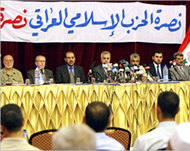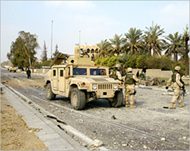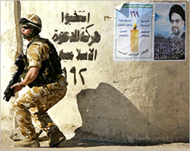‘Charter ignores Iraq’s historical identity’
Tariq al-Hashimi, secretary-general of the Iraqi Islamic Party, tells Aljazeera.net during a visit to Doha that the fires burning in Iraq could soon engulf other Arab countries unless they change their current negative attitude.

Aljazeera.net: How do you introduce the Iraqi Islamic Party to a Western audience?
Al-Hashimi: The Iraqi Islamic Party is a political party whose philosophy is based on the Islamic Sharia. It believes in moderation and effective participation in Iraqi politics.
The party believes that this is a divine duty and everyone must perform it in order to save the country from its current situation and liberate it eventually.
When was the party established?
The party was established in 1960. Successive Iraqi governments banned the party and it operated underground inside Iraq until the removal of Saddam Hussein’s government in 2003.
What impact has it had?
The Iraqi Islamic Party decided from the beginning to be a key player in post-war Iraq’s politics. It thus participated in the Iraqi Interim Governing Council (IGC) and the subsequent interim Iraqi government.
We also joined the interim Iraqi general assembly, but withdrew from last January’s elections in protest against the attack on Falluja in November 2004 and the killing of hundreds of civilians.
The party is currently working hard to take part in the elections to be held later this year.
Western news agencies refer to the Iraqi Islamic Party as a Sunni Arab party. Is that a correct description?
If you study the party’s literature, you will know that our party has nothing to do with sectarianism. It subscribes to Islamic political principles and addresses people regardless of their ethnic and religious identities.
The Iraqi Islamic Party’s history records that its first meeting in July 1960 in Baghdad was attended by Shias, Kurds, and Turkmen in greater numbers than by Sunni Arabs.
 |
|
‘Participating in the IGC was a |
The party is dedicated to the whole Iraqi population and pursues a national agenda. But it will always stand up for any Iraqi community suffering from isolation and suppression. As this is what has happened to Iraqi Sunni Arabs, we are committed to defending them.
Sunni Arabs are being subjected to sectarian genocide and the Iraqi Islamic Party is therefore defending them. But this by no means will affect the party’s commitment to its national agenda.
But this contradicts your participation in the IGC, which was set up along sectarian and ethnic lines?
You are right, but any position that we take, we discuss it first according to Sharia and subject it to a balanced debate. We tend to give any offer the benefit of the doubt and study its pros and cons.
Sharia does not mean a rigid commitment to the Quran and Sunna (the sayings of Prophet Muhammad). Political Sharia enjoys a wide discussion area. We studied the idea of joining the IGC and decided that Islam should have a voice in this council and we should take part in rebuilding Iraq on an Islamic basis.
What did you achieve in the IGC?
We did not achieve much really, but it was a useful exercise during which we took some historic stands, and we are proud of them despite the reservations of many Iraqis.
You mentioned suppression by successive Iraqi governments, and that obviously includes Saddam Hussein’s government. Does that mean you had some form of cooperation with the US before the invasion of Iraq in 2003?
We worked with the then Iraqi opposition, and we were an active faction. However, we did not participate in two opposition conferences which had a big say in determining the destiny of Iraq – namely, the London conference and the Salaheddin gathering.
We distanced ourselves from those meetings for the reason that they approved of the foreign invasion of Iraq to topple the government of Saddam. We were against this approach.
The most important issue in Iraq nowadays is the constitution. You joined the Sunnis in rejecting that charter. Can you explain your objections?
We are deeply concerned about Iraq’s Arab identity being ignored. The constitution ignores Iraq’s historical identity.The charter prepares the grounds for breaking up Iraq into several tiny sect- and ethnicity-based states.
You spent a week in northern Iraq discussing the differences concerning the proposed constitution with the Kurdish leader Masuod Barzani. What came out of the meeting?
The visit was in response to an official invitation by the Kurdistani coalition, to discuss some issues in the draft constitution which was submitted to the Iraqi General assembly on August 22. We believe those issues are still pending.
It was a hard and sometimes heated discussion. We managed to agree to rewrite some of the disputed articles, but some articles remained unresolved.
Issues such as federalism, the introduction of the constitution document, and the language have been resolved. But I have to voice my disappointment over submitting the draft constitution to the UN without changing the article on federalism as per our agreement with our brothers, the Kurds.
 |
|
‘If we were in power, we’d have |
The relation between the central government and the proposed federal regions are one of our main concerns, whereas the constitution gives the right to every region to establish its own army. Those armies are referred to in the constitution as regional guards.
The regional armies have the right to claim the sovereignty for their regions and have the right to compete with the central army.
We asked our brothers, the Kurds, to define the meaning of regional guards. What are the equipment intended for them? What is the size of their manpower? We did not get clear answers. Then we asked to renegotiate the regulations that govern their work, but our request was turned down.
You have sided with the Sunni Arabs in rejecting the constitution. But what are your goals?
Our only goal is to preserve Iraqi unity, because we believe it is the only guarantee to driving the foreign forces out of our country.
Some analysts say the Sunni Arabs are rejecting the constitution because it does not guarantee them the power they enjoyed in the past and because their region is resource-poor. What is your response?
The region of the Sunni Arabs (although this forces us to talk in sectarian terms) is not poor. I will give proof for that, in the form of an incident that occurred recently.
We told our Shia and Kurdish brothers that we want a phrase in the constitution to be changed. The phrase says “each region enjoys the full control of its oil and gas resources”. We wanted it to be changed to “the central government enjoys the full control over Iraq’s natural resources”.
They told us it is not in the Sunni Arabs’ benefit because their region contains huge quantities of phosphates, sulphates and other resources in addition to their control of the country’s water resources. They said why is that we want to lose our resources.
The Sunni answer was that their aim was Iraq’s unity, not sectarian gains.
Do you think the Sunni Arabs will manage to get the constitution rejected in the forthcoming referendum?
The problem is we do not trust any poll in Iraq, and our experience with last January’s elections has not been encouraging. There is negligence in the work of the election committee and the work of UN in this regard.
I believe Sunni Arabs will try [to have the draft charter rejected], but whether or not voting will be properly conducted, we do not know. Hundreds and thousands of voting applications were found amid garbage in the last elections. Nobody knows how that happened.
In the last election, there were people belong to certain sects and ethnic groups installed in each polling station, and they had total freedom in manipulating the results in favour of their people.
We are afraid that the same fraud will be repeated in the forthcoming referendum and the forthcoming election.
You mentioned in the beginning of the interview that you believed in political participation. Do you still believe it will achieve anything for the Iraqi Islamic Party?
We are now more determined than ever before on taking part in the political process. Although our boycott of the last election was not a mistake given the prevailing circumstances, we have to confess that we paid dearly for that decision.
Because of our absence, a very important Iraqi community got left out of the decision-making process, resulting in the domination of one sect over the country’s wealth and power.
Sadly this sect is filled with ill-will and the desire to push away its partner. This is demonstrated by the daily killings and sectarian genocide of the Sunnis. We have to participate in the elections to prevent these atrocities and create a balance of power.
Does your enthusiasm about political participation mean you are against the armed revolt?
Definitely not. We know that all that we are doing is to be able to reach the final goal, which is to drive the occupier out of our country. But we think the political and the armed forces should fight shoulder to shoulder to achieve this objective.
Do you believe if you became a part of the government, you would be able to prevent operations such as the one in Tal Afar?
It is highly unlikely that we will become part of the military strategy. The US army always seeks our help in communicating with people in troubled areas and our advice on how they should they deal with any situation.
I believe if we were in power, we would have more authority to force them to take our advice more seriously.
We will push for a political solution to every problem. And we will make sure that the military option is the very last resort, which is not the case now.
The US has made it clear that it does not want dialogue with “terrorists” and, accordingly, American forces in Iraq do not hold try to talk negotiate with Abu Musab al-Zarqawi’s fighters who, according to the US army and the Iraqi government, had made Tal Afar their base.
This is a great insult to the heroic Iraqi resistance and a bid to hijack the pure Iraqi resistance. The resistance in Iraq is Iraqi, not Arab.
One must make a differentiation between groups such as al-Tawhid wa al-Jihad Army, which has ties to al-Qaida, and the Iraqi resistance. In fact, there are many ideological differences between al-Zarqawi and the other Iraqi Islamic resistance factions.
How do you analyse the ongoing violence in Iraq, notably incidents such as the Kadhimiya bombing which killed hundreds of innocent Iraqi workers?
I would like to say first, the Americans are the only party who know what is going on in Iraq. They are the sole player and they are the sole power.
What happened in Kadhimiya was a bid to divide the Iraqi people and establish two factions, Shias and Sunnis, fighting each other.
The US and Iran have been in deep conflict since the establishment of the Islamic republic in Iran in 1979. How do you explain the domination of pro-Iran figures on political power in a US-controlled Iraq?
I think there is a conflict between the interests of the Zionist lobby in Washington and the US national interest.
It is in America’s national interest to create an ideal Iraq that would be a model for the rest of the Arab countries.
But the Zionist objective is different and it is very close to the Iranian one. This project aims at promoting Iranian influence in Iraq and the rest of the region.
 |
|
‘Upsetting stability in the Arab |
There are pockets in several Arab countries such as Kuwait and Saudi Arabia ready to explode. Upsetting regional stability and planting Iran in the Arab world is a Zionist and Israeli dream.
There is a competition going on in Washington, and thus far it is the Zionist lobby that has been winning, which is why Iran is gaining in influence in Iraq.
The other scenario is that, the US is trying to involve Iran in Iraqi affairs before it uses Tehran’s involvement as a political card in its standoff with Iran over the latter’s nuclear programme.
But in my view, Iran is already the winner – it has had to sacrifice nothing, yet the parties propped up by it are already ruling Iraq.
I believe the world will not have to wait for long before it wakes up to an Iranian declaration of ownership of the nuclear bomb.